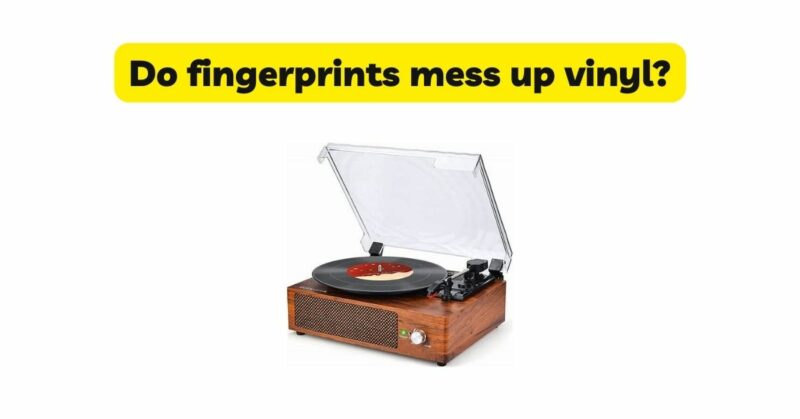Vinyl records have experienced a resurgence in popularity, captivating music enthusiasts with their unique sound quality and tangible nature. However, concerns about potential damage to vinyl records caused by fingerprints have lingered among collectors and listeners. In this article, we will delve into the question: Do fingerprints mess up vinyl? We will debunk common myths, explore the science behind vinyl record maintenance, and provide guidelines for proper vinyl handling to preserve the integrity of these cherished analog treasures.
- The Myth of Fingerprints Damaging Vinyl
One prevalent myth is that fingerprints can permanently damage vinyl records. However, this notion is largely unfounded. Vinyl records are made from durable materials, typically polyvinyl chloride (PVC), which is resistant to most oils and contaminants found on human skin. While fingerprints can leave temporary smudges or marks on the surface, they generally do not cause long-term harm to the vinyl itself or significantly affect the sound quality.
- Understanding Vinyl Grooves: How Fingerprints Interact
To better understand the impact of fingerprints on vinyl records, it is crucial to comprehend the structure and function of the record’s grooves. The grooves contain the audio information and are delicate, especially in comparison to the sturdy vinyl material. Fingerprints can temporarily disrupt the smooth surface of the record, potentially altering the way the stylus tracks the groove. This interference may introduce additional noise or cause the stylus to skip, affecting the playback quality.
- Proper Vinyl Handling: Minimizing the Risk of Fingerprints
To mitigate the potential negative effects of fingerprints, it is essential to handle vinyl records with care. Here are some guidelines for proper vinyl handling:
a. Clean Hands: Before handling vinyl records, thoroughly wash and dry your hands to remove any oils, dirt, or contaminants that could transfer onto the record surface.
b. Hold the Edges: When picking up a vinyl record, avoid touching the playing surface. Instead, hold the record by its edges or along the label area to minimize contact with the grooves.
c. Finger Placement: If you need to touch the playing surface, gently place your fingertips on the outer edges, taking care to avoid pressing down or dragging your fingers across the grooves.
d. Use Protective Sleeves: Keep vinyl records stored in protective inner sleeves when not in use. These sleeves serve as a barrier against fingerprints, dust, and other potential contaminants.
e. Clean the Record: Regularly clean your vinyl records using appropriate record cleaning solutions and brushes to remove accumulated dirt, dust, and fingerprints. Follow the recommended cleaning techniques to avoid further damage.
- Sound Quality and Playback Issues
While fingerprints may not cause permanent damage to vinyl records, they can affect the sound quality and playback experience. When the stylus encounters a fingerprint on the groove, it may pick up additional noise or cause the stylus to momentarily skip, resulting in a disruption to the audio reproduction. However, these issues are typically temporary and can be resolved by properly cleaning the record and ensuring a clean stylus.
- Other Factors Affecting Vinyl Record Longevity
It is worth noting that fingerprints are not the only factor that can impact the lifespan and sound quality of vinyl records. Environmental factors such as temperature, humidity, and exposure to sunlight can have more significant consequences. High temperatures can cause warping, while excessive humidity may lead to mold or mildew growth. Sunlight exposure can fade album covers and affect the vinyl’s physical integrity. Therefore, it is crucial to store vinyl records in a cool, dry place away from direct sunlight to maintain their longevity.
Conclusion
Contrary to popular belief, fingerprints alone do not typically cause permanent damage to vinyl records. While they may temporarily affect playback quality, proper handling and regular cleaning can mitigate any negative effects. The primary concern in vinyl record maintenance lies in preserving the grooves, as they are crucial to maintaining sound quality. By adhering to best practices in vinyl handling and maintaining a clean environment for storage, collectors and listeners can continue to enjoy the unique experience and exceptional sound quality that vinyl records offer, without undue worry about fingerprints.


